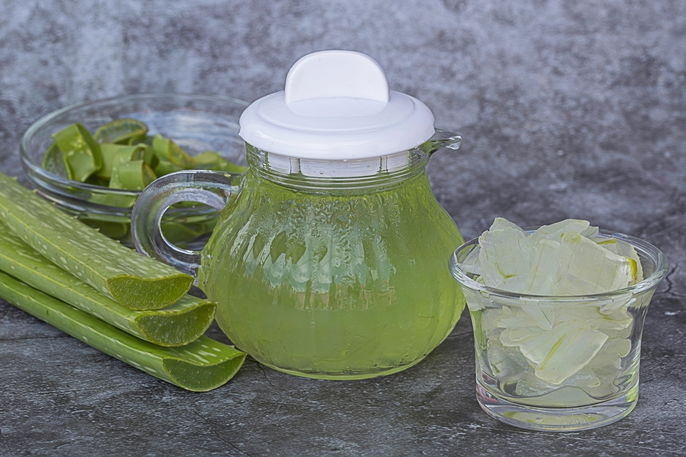Aloe vera juice is made from the leaves of the aloe vera plant, which is a medicinal plant containing large quantities of vitamin A, vitamin C, and minerals. These nutrients possess antioxidant, prebiotic, anti-inflammatory, and immunomodulatory properties that support wound healing, promote hydration of the skin and hair, and help strengthen the immune system.
Aloe vera contains aloin, a compound found in the latex derived from the skin of the aloe leaf. Aloin has a laxative effect, as well as antioxidant and antimicrobial properties. It is important to extract aloin from the plant before making aloe vera juice, as ingesting more than 10 mg per day of this substance can be toxic, leading to diarrhea and abdominal pain.
Aloe vera juice can be found ready-made at natural food stores or supermarkets, which is considered the safest way to drink it. Another option is to prepare aloe vera juice at home, with the recommendation to remove the latex from the leaves first in order to get rid of the excess aloin and avoid toxicity.

Health benefits
Aloe vera juice may be indicated for:
1. Relief of constipation
Aloe vera juice contains a small quantity of aloin, a substance present in the skin of the aloe plant that acts as a laxative by drawing fluid into the intestines, stimulating intestinal motility and making it easier to have a bowel movement.
Aloe vera juice also acts as a prebiotic, promoting the growth of good bacteria in the gut and helping to prevent constipation by maintaining the balance of intestinal flora.
Also recommended: Natural Laxatives: 15 Fruits That Relieve Constipation tuasaude.com/en/natural-laxatives2. Maintaining healthy skin and hair
Vitamin A, vitamin, C, vitamin E, and other minerals found in aloe vera juice help to hydrate the skin and hair and also promote collagen production, helping to improve elasticity and glow. Read about the benefits of collagen.
Aloe vera juice also has an antioxidant effect, helping to combat free radicals in the skin that can lead to premature aging.
Also recommended: Aloe Vera for Hair: 7 Health Benefits & How to Apply tuasaude.com/en/aloe-vera-for-hair3. Lowering cholesterol and triglycerides
Aloe vera juice contains high amounts of antioxidants that prevent oxidation of fat cells, decreasing levels of cholesterol and triglycerides in the blood and protecting against health conditions like atherosclerosis, heart attack, and stroke.
4. Strengthening the immune system
Aloe vera juice contains vitamin C, flavonoids, and tannins, compounds possessing potent antioxidant and immunomodulatory properties that help fortify immune cells.
Also recommended: Immune System Boosters: Foods, Natural Remedies & Recipes tuasaude.com/en/immune-system-boosters5. Gastritis
Aloe vera juice stimulates the secretion of digestive enzymes and neutralizes acid in the stomach, helping in the treatment of acid reflux and gastritis.
Aloe vera juice is also a potent anti-inflammatory, and may be used to help treat inflammation and other stomach problems.
Read about other home remedies for gastritis.
6. Diabetes control
Aloe vera juice contains flavonoids, aloin, and vitamin C, which are potent antioxidants that improve insulin function, helping to control diabetes by regulating levels of glucose in the blood.
7. Treatment of infections
Due to its antiviral, antibacterial, and antiseptic properties, aloe vera juice can be used to help with wound healing and the treatment of burns. It can also be used as a complementary therapy for the treatment of psoriasis, herpes, and candidiasis.
How to make
To make aloe vera juice at home, you must first remove the leaves from the plant, wash and dry them well, and remove the spines. Next, make a cut at the base of the leaf and let it rest in an upright (vertical) position to allow the latex (the yellow substance inside the leaves) to drain.
Next, use a knife or pair of scissors to cut down the sides of the leaves, lengthwise. Place the leaf on the counter and carefully peel the skin from one side, using a rounded object to avoid contaminating the gel with any latex that may still be contained in the plant. Remove any green or yellow pieces from the gel.
Place 3.5 ounces (100 grams) of gel in a blender along with 32 ounces (1 liter) of water. You can also add a spoonful of honey and fruit like lemon or orange to improve the taste. Blend well and drink.
Safety considerations
Some studies suggest that it is not safe to drink homemade aloe vera juice without properly removing the skin and yellow latex liquid, as this substance may be linked to colon cancer. Current studies are inconclusive, however, and more research is needed to confirm these risks.
Side effects
Aloe vera juice can cause abdominal pain, vomiting, diarrhea, red urine, and liver problems. It can also lead to hypokalemia (low levels of potassium in the blood), which can present with symptoms like weakness, cramping, tingling, numbness, and cardiac arrhythmias.
Contraindications to use
Aloe vera juice is not recommended for people who are pregnant or breastfeeding. It should not be consumed by children less than 12 years old.
Aloe vera juice is also contraindicated in people with diarrhea, liver problems, bowel obstruction or stenosis, atony (lack of normal muscle movement and tone), appendicitis, Crohn's disease, ulcerative colitis, unexplained abdominal pain, and dehydration.
Before you ingest aloe vera juice, be sure to tell your doctor about any other medications you are taking or medicinal plants you are using, as aloe vera juice can interfere with the actions of certain medications.






























